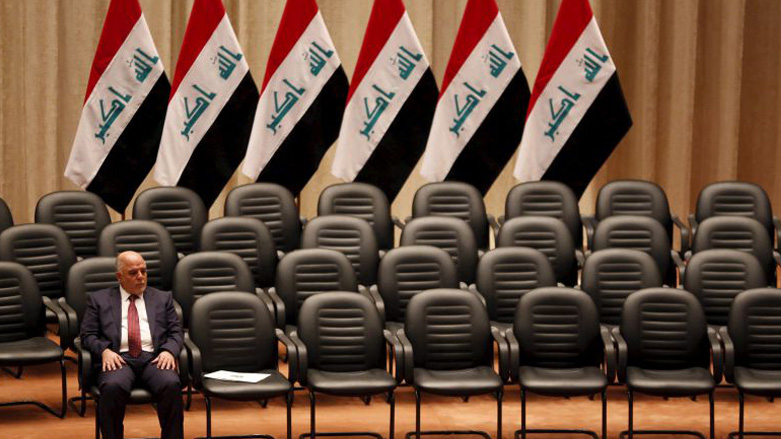Abadi 'loses election battle' early with collapse of coalition

WASHINGTON DC, United States (Kurdistan 24) – Two days after Prime Minister Haider al-Abadi made the surprise announcement that he would run in Iraq’s next election in alliance with the Iranian-backed Shia militias known as the Popular Mobilization Forces (PMF), on Monday, they all withdrew from his coalition.
Abadi is widely seen as America’s candidate, and Iran had sought to slip its people into Iraq’s next government under Abadi—just as pro-Iranian forces play a strong role in Lebanon under cover of the Sunni Prime Minister, Saad al-Hariri.
Iran’s gambit in Iraq, however, now seems to have failed. In that sense, the collapse of the coalition is a setback for Tehran.
However, Abadi has lost standing through his political maneuvering, and it seems unlikely that he can win enough votes to become Iraq’s next prime minister. In this sense, the collapse of Abadi’s coalition is also a setback for Washington.
It all depends on who wins the vote. It is now quite possible that Hadi al-Ameri, the pro-Iranian head of the PMF, could become Iraq’s next prime minister. In that case, the collapse of Abadi’s coalition will be a very substantial setback for Washington.
Entifadh Qanbar, an Iraqi-American who heads the Future Foundation in Washington DC, told Kurdistan 24, “Abadi has lost the elections, before the elections.”
Izzat al-Shabandar, an Iraqi MP from Abadi’s own al-Dawa party, expressed a similar view on social media, “Abadi has lost the election battle early.”
Abadi was not popular to begin with – which is why he aligned himself with the PMF. But with that alliance broken, he has lost support from that quarter, even as he has now “betrayed” – by his short-lived alliance with the PMF – those who thought of him as a liberal, Qanbar explained.
Many Iraqis are now calling Abadi “the liar” and “the crook” for his flip-flopping, Qanbar said.
In coalition discussions on Monday, al-Ameri, who may well be Iraq’s most popular political figure, reportedly told Abadi, “At maximum, you can get four seats. Why should you be the next prime minister?”
On Sunday, the influential, firebrand Shia cleric, Muqtada al-Sadr, wrote a letter, released to the media, in which he denounced Abadi’s coalition as “sectarian” and “corrupt.”
Reportedly, Sadr’s letter played a significant role in the collapse of Abadi’s coalition.
A Kurdish lawmaker expressed a similar view to Kurdistan 24, as he explained that Abadi had “too many little and unknown parties,” as well as “corrupted ones.”
Since parliament has yet to formally approve a date for the elections – which Abadi has set for May 12 – this lawmaker is unsure when they will actually occur. He suggested that they could be postponed for a significant time, because large numbers of Sunni Arabs and Kurds remain displaced.
However, if the vote is held as scheduled, Abadi’s collapse opens the way for another politician, Ayad Allawi, to assume the mantle of the candidate who most represents a more liberal, non-sectarian direction for Iraq.
Allawi previously led Iraq, becoming Interim Prime Minister of Iraq in 2004, as the Bush administration terminated the ill-fated Coalition Provisional Authority, which it had established the year before.
Throughout the ongoing crisis between Baghdad and Erbil, Allawi has been sympathetic toward the Kurds. In the view of at least one Kurdish lawmaker, Allawi would be the best candidate from a Kurdish perspective.
Editing by Nadia Riva
